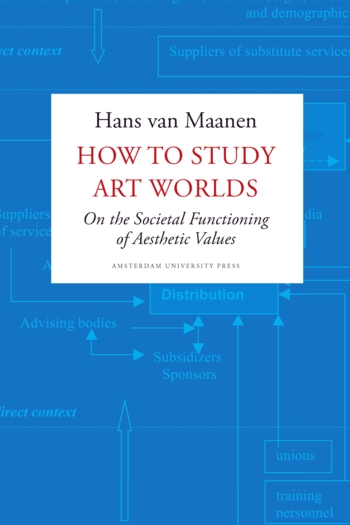Hans van Maanen: How to Study Art Worlds: On the Societal Functioning of Aesthetic Values (2009)
Filed under book | Tags: · actor-network theory, aesthetics, art theory, sociology, sociology of art

“This study brings together the organisational side of the world of the arts and the understanding of the many functions art fulfills in our culture. The author sets out to establish how the organisation of art worlds serves the functioning of the arts in society. The book is divided into three sections, the first of which presents a comparative study of approaches to the art world as practiced by Dickie, Becker, Bourdieu, Heinich, and Luhmann, among others. The second part focuses on the philosophical debates concerning ‘aesthetic experience’. Besides Kant, scholars such as Gadamer, Foster, Shustermann, Schaeffer and Carroll come to the fore. In the third part, the author traces the consequences of these theoretical approaches for the organization of art world practices.”
Publisher Amsterdam University Press, 2009
Creative Commons BY-NC 3.0 License
ISBN 9089641521, 9789089641526
311 pages
PDF, PDF (2 MB, updated on 2016-7-18)
Comment (0)tripleC journal: Capitalist Crisis, Communication & Culture, Vol 8, No 2 (2010)
Filed under journal | Tags: · capitalism, communication, financial crisis, information society, information technology, media
The worldwide economic downturn is indicative for a new large crisis of capitalism. The future of capitalism is in this situation not determined, but depends on collective human agency. This introduction to the special issue of tripleC on “Capitalist Crisis, Communication & Culture” presents general arguments about the crisis, a general model of the political economy of capitalist communication, and a systematic typology of literature about capitalist crisis & communication. The introduced model of the political economy of capitalist communication is comprised of seven interconnected moments: 1) the media content industry, 2) the media infrastructure industry, 3) the interaction of the media economy and the non-media economy, 4) the interaction of the finance sector and the media economy, 5) alternative media, 6) media reception, 7) media prosumption. The model is used for classifying actual and potential research about the communicative dimension of the new capitalist crisis.
tripleC (cognition, communication, co-operation): Open Access Journal for a Global Sustainable Information
Society 8 (2): 193-309.
Editors: Fuchs, Christian, Matthias Schafranek, David Hakken and Marcus Breen.
Special issue on “Capitalist crisis, communication & culture“.
tripleC is a peer-reviewed, open-access journal (ISSN: 1726-670X)
All journal content, except where otherwise noted, is licensed under the Creative Commons Attribution-NonCommercial-NoDerivs 3.0 Austria License.
Mary Joyce (ed.): Digital Activism Decoded. The New Mechanics of Change (2010)
Filed under book | Tags: · activism, facebook, mass media, media activism, social movements, twitter, web 2.0

The media have recently been abuzz with cases of citizens around the world using digital technologies to push for social and political change—from the use of Twitter to amplify protests in Iran and Moldova to the thousands of American nonprofits creating Facebook accounts in the hopes of luring supporters.
These stories have been published, discussed, extolled, and derided, but the underlying mechanics of the practice of digital activism are little understood. This new field, its dynamics, practices, misconceptions, and possible futures are presented together for the first time in Digital Activism Decoded.
Topics include:
* how to think about digital activism
* the digital activism environment: infrastructure, social, political, and economic factors
* digital activism practices: two research perspectives and the danger of destructive activism
* digital activism’s value: balancing optimism and pessimism
* building the future of digital activism
Publisher: International Debate Education Association, New York, June 2010
Licensed under the Creative Commons Attribution License BY-NC 3.0 US.
ISBN 978-1-932716-60-3
228 pages
Video from the book launch and discussion
More

